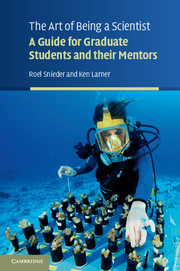Book contents
- Frontmatter
- Contents
- 1 Introduction
- 2 What is science?
- 3 Choices, choices, choices
- 4 The adviser and thesis committee
- 5 Questions drive research
- 6 Giving direction to our work
- 7 Turning challenges into opportunities
- 8 Ethics of research
- 9 Using the scientific literature
- 10 Communication
- 11 Publishing a paper
- 12 Time management
- 13 Writing proposals
- 14 The scientific career
- 15 Applying for a job
- 16 Concluding remarks
- Appendix A Further reading
- Appendix B A sample curriculum
- Appendix C The Refer and BibTeX format
- References
- About the authors
- Index
11 - Publishing a paper
Published online by Cambridge University Press: 05 June 2014
- Frontmatter
- Contents
- 1 Introduction
- 2 What is science?
- 3 Choices, choices, choices
- 4 The adviser and thesis committee
- 5 Questions drive research
- 6 Giving direction to our work
- 7 Turning challenges into opportunities
- 8 Ethics of research
- 9 Using the scientific literature
- 10 Communication
- 11 Publishing a paper
- 12 Time management
- 13 Writing proposals
- 14 The scientific career
- 15 Applying for a job
- 16 Concluding remarks
- Appendix A Further reading
- Appendix B A sample curriculum
- Appendix C The Refer and BibTeX format
- References
- About the authors
- Index
Summary
Publications are the primary means for distributing, establishing, and archiving scientific results. The decision to hire or promote somebody is often based to a large extent on the number and quality of publications that the individual has written. Because, typically, the number of copies of a journal article that are printed is orders of magnitude larger than the number of thesis copies made, papers in technical journals are of much larger value to the scientific community than are theses. Because most graduate students must prepare and defend a thesis, the best of both worlds for them exists in graduate programs that both encourage students to publish their research work during the course of their studies and allow them to use their published or submitted papers, perhaps in an adapted form, as chapters in their thesis. For all the above reasons, scientific publications are of great importance. In this chapter we suggest questions to contemplate prior to writing a paper, steps to take during the submission and review process, and actions to consider while the paper is in press and afterward.
BEFORE YOU START WRITING
Before writing a manuscript you need to decide in which journal you intend to publish your work. The choice of journal for publication can be of crucial importance. Among other reasons, this decision can influence the tone and content of the paper, its length, and the format you use.
- Type
- Chapter
- Information
- The Art of Being a ScientistA Guide for Graduate Students and their Mentors, pp. 176 - 185Publisher: Cambridge University PressPrint publication year: 2009

